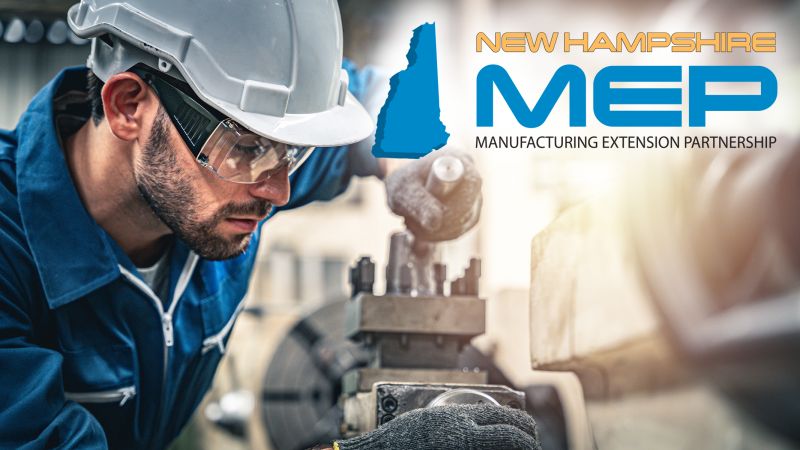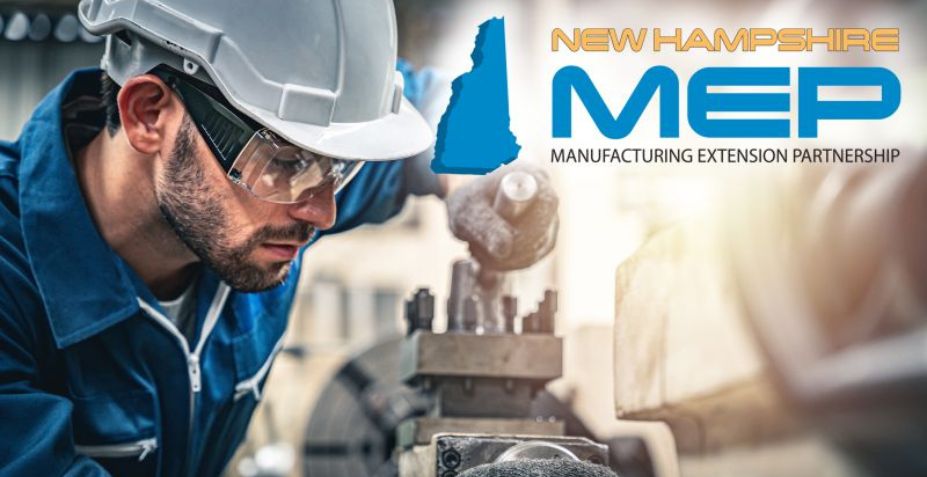 This was our second time attending the New Hampshire Manufacturing Extension Program (NH MEP) Governor’s Advanced Manufacturing and High Technology Summit – and first as a sponsor. The focus of the Summit was on networking and developing a manufacturing community in New Hampshire.
This was our second time attending the New Hampshire Manufacturing Extension Program (NH MEP) Governor’s Advanced Manufacturing and High Technology Summit – and first as a sponsor. The focus of the Summit was on networking and developing a manufacturing community in New Hampshire.
The day was full of learning with three keynotes focused on the CHIPS ACT, AI in Manufacturing, and Women in manufacturing. In addition, we heard from Senator Maggie Hassan and Representative Chris Pappas who both affirmed their support for manufacturing in New Hampshire. The following is a summary highlights what our team learned from the keynotes:
Keynote 1: CHIPS ACT
Presented by: Jesse Stoneman, the Deputy Director of Public Engagement of the CHIPS for America Team
Global semiconductor sales are currently at $600B with a forecast of $1T by 2030. Today, 12% of semiconductors and 0% of leading-edge semiconductors are manufactured in the US. The United States is reliant on semiconductors for everything from automobiles to health care, and national defense. The pandemic exposed the risk that the US economy and national security are subject to due to the reliance on foreign manufacturing for their semiconductor supply chain.
The CHIPS ACT was passed in August of 2022 with the primary goal of enhancing national and economic security. The bill includes a total of $280B in funding to boost manufacturing and research within the US. $39B is in subsidies with the goal of re-shoring manufacturing in the states, and $11B in R&D subsidies aimed at keeping that manufacturing here. The remaining $230B is in the form of investment tax credits.
The bulk of the money is geared towards large fabrication, materials, and equipment facility projects. While companies like NeoMatrix can certainly provide services relevant to the execution of the CHIPS incentives program, we’re not qualified to apply on our own. The CHIPS Act addressed this by creating the ‘Teaming Partner List’.
Keynote 2: The Impact of AI in Manufacturing
Presented by: Kyle Schofield, AI Specialist & Senior Client Services Manager, Mainstay Technologies
Artificial Intelligence is a hot topic today; however, a lot of folks are struggling with how to apply it to their everyday lives. Kyle Schofield delivered an excellent presentation that captivated both those experienced and inexperienced with AI.
Kyle began by explaining that while there are some risks to AI, there is no impending threat of ‘Skynet’ eliminating the human race. Rather, we should be learning how to take advantage of these new tools – primarily large language models such as ChatGPT. Users can interface with LLMs with natural language and for the purposes of information retrieval, content creation, and even writing code. The benefits are real, and businesses need to start embracing them now.
Kyle gave some great advice on how to start using the technology today while simultaneously safeguarding against some potential downfalls:
- Encourage the use of ChatGPT today – and pay the $20/month for ChatGPT 4.
- Pay attention to what others in your space are doing with AI – you don’t want to be left behind.
- Be aware of new entrants to the space – there will be something better than ChatGPT someday.
- Create an ‘Acceptable Use Policy’ for both AI and things like internet usage.
- Create and empower champions within your company to figure out how to best implement the technology within your business.
Keynote 3: Women in Manufacturing
Presented by: Amy Bassett, District Director, US Small Business Administration
Historically men have greatly outnumbered women in manufacturing, and while it is changing – the balance is still skewed. The third panel of the day was hosted by Amy Bassett, District Director of the SBA, and it included the following women leaders in New Hampshire Manufacturing:
- Adria Bagshaw, Vice President, W.H. Bagshaw Company
- Cara Burzynski, President, AeroDynamics, LLC
- Melissa Florio, President and Partner, Ambix
The session kicked off with each woman discussing how they arrived at their current roles and it was quite interesting to hear about their diverse backgrounds which ultimately led them to where they are today. The conversation naturally moved to what all of us can do today to attract more women to manufacturing and a common theme was to get women involved at a younger age. A couple of ideas came out of the conversation which I think could be a great place for folks to help promote manufacturing at a younger age: the Girl Scouts and students in technical or vocational high schools.
A commenter from the crowd mentioned that the Girl Scouts are often associated with cookies and arts and crafts; however, today they are heavily focused on STEM activities. Leaders in manufacturing looking to give back to the community should think about offering some time to the Girl Scouts and letting young women know about the potential for an exciting career in manufacturing.
Get students in vocational and technical high schools involved through plant tours and part-time jobs. It was brought up that students of that age often aren’t permitted on the plant floor; but a couple of options were given to combat that issue:
- Perform plant tours virtually. The technology exists today to be able to deliver a virtual tour to the classroom, eliminating the safety risk as well as additional costs and headaches of travel to the facility.
- Have the students work in areas of the plant which aren’t as dangerous such as QC labs.
New Hampshire Manufacturing Extension Program in 2024
The one-day event was a success from both a networking and educational experience. At the conclusion of the show, Tony Fernandez, New Hampshire Manufacturing Extension Program Center Director & President, mentioned that they were planning to grow for next year. I would encourage anyone involved with manufacturing in NH to put it on the calendar for next year and to follow NH MEP on LinkedIn.


 November 7, 2023
November 7, 2023 
 December 2, 2025
December 2, 2025 

